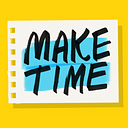Fancy Tools Are a Distraction—Here’s What I Use Instead
What’s the best to-do app? The most exquisite notepad and pen for taking notes and sketching? The finest watch?
It’s not hard to find answers to these questions. Well, at least someone’s answers — everyone has their favorites. The Internet is home to many a treatise about The Best This or The New Way to Do That.
(In fact, talk of gadgets, apps, tools, and gear follows only cat videos in Internet popularity. This is according to my proprietary Study of Links I’ve Clicked, of course.)
I’m not immune to this obsession with tools. Just a few months ago, I wrote about One Big Thing, a great new app for planning your days. I love cooking with my kitchen knives and my fancy cookware at home. And then there’s Sprint, our book about rapid problem solving, which insists on a particular set of notepads, pens, and sticky dots.
So here I am with another Medium post about tools. But this one is different. This post argues against fancy tools and in favor of simple, cheap items you can find anywhere.
Here’s my argument: I think fancy tools are a distraction from work that matters. We live in a world of abundant choices, and fancy tools give us yet another way to stay busy while avoiding the work we mean to do.
Easier than actual work
It’s easier to set up a fancy writing app on your Mac than to actually write the screenplay you’ve been dreaming of. It’s easier to buy Japanese notepads and Italian pens than to actually start sketching the app you want to build. And unlike checking Facebook — which everyone knows isn’t productive — messing with fancy tools feels like work. But it’s not.
But let’s say you’re past all this. You’ve selected your tools carefully and configured them for your workflow. Your tools are not a distraction; they help you do great work efficiently day after day.¹ You still have a potential problem: what if your tools let you down?
The fragility of fancy tools
Fancy tools are fragile. I don’t mean physically fragile (although sometimes they are); I mean fragile in the way that Nassim Taleb means it.
The email app that changed how you manage your inbox? It was acquired and shut down. You broke your phone and now you have to reconfigure and restore your apps and data. You keep your notes in a Japanese Midori MD notebook with grid lines… but you left it at home.
And consider the psychological effects. When your productivity depends on a particular suite of tools, what happens when you don’t have your tools? Can you grab a Bic pen and a legal pad and make the same kind of progress? Are you thinking about your work, or your tools?
It took a while to break my obsession with fancy tools. And I’m not entirely free of this particular distraction. But when it comes to my everyday work, I’ve tried to adopt simple tools that are readily available. Nowadays, I hardly think about my tools. And when I lose one or something breaks or I run out of supplies or forget my things at home, I don’t miss a beat.
My favorite (simple) tools
I can’t write about tools without showing you my favorites. Here are the simple non-fancy tools that I use every day.
¹ There are indeed some kinds of work where tools have a profound effect on quality and efficiency. Carpentry, software engineering, and cooking come to mind. And others, like surgery and window washing, where tools are a matter of life or death. In these fields, the benefits of fancy tools outweigh the downsides.
Want to read more? Take a look at Make Time. It’s all about finding focus and energy in your daily life.

